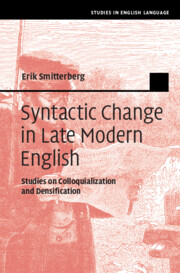Book contents
- Syntactic Change in Late Modern English
- Studies In English Language
- Syntactic Change in Late Modern English
- Copyright page
- Contents
- Figures
- Tables
- Acknowledgements
- Chapter 1 Introduction
- Chapter 2 Sociocultural and Linguistic Change in Late Modern English
- Chapter 3 Aspects of Language Change
- Chapter 4 Methodological Framework
- Chapter 5 Colloquialization I: Not-Contraction
- Chapter 6 Colloquialization II: Co-ordination by And
- Chapter 7 Densification I: Nouns as Premodifiers in Noun Phrases
- Chapter 8 Densification II: Participle Clauses as Postmodifiers in Noun Phrases
- Chapter 9 Concluding Discussion
- Appendix
- References
- Index
Chapter 6 - Colloquialization II: Co-ordination by And
Published online by Cambridge University Press: 19 November 2021
- Syntactic Change in Late Modern English
- Studies In English Language
- Syntactic Change in Late Modern English
- Copyright page
- Contents
- Figures
- Tables
- Acknowledgements
- Chapter 1 Introduction
- Chapter 2 Sociocultural and Linguistic Change in Late Modern English
- Chapter 3 Aspects of Language Change
- Chapter 4 Methodological Framework
- Chapter 5 Colloquialization I: Not-Contraction
- Chapter 6 Colloquialization II: Co-ordination by And
- Chapter 7 Densification I: Nouns as Premodifiers in Noun Phrases
- Chapter 8 Densification II: Participle Clauses as Postmodifiers in Noun Phrases
- Chapter 9 Concluding Discussion
- Appendix
- References
- Index
Summary
In this chapter, the units linked by the co-ordinator and are shown to correlate with orality: oral genres use more super-phrasal (e.g. clausal) co-ordination, while higher proportions of phrasal co-ordination characterize literate genres. A development towards more super-phrasal co-ordinationcan thus indicate colloquialization. Analyses demonstrate that newspapers, parliamentary debates, and letters written by men exhibit this very trend in diachrony, while women’s letters unexpectedly develop in the opposite direction. The latter change, however, is shown to be a result not of anti-colloquialization, but of an increased reliance on the sentence as a unit of written discourse in letters by women; main clauses are increasingly placed in separate sentences or separated by semicolons rather than being linked with dashes and co-ordinators, which was a feature of several women’s idiolects in the early nineteenth century. Sentence-initial and, which was a proscribed feature, is the focus of a separate study and is shown to increase in frequency in speech-based and speech-purposed writing. Overall, the results point to colloquialization in several genres.
- Type
- Chapter
- Information
- Syntactic Change in Late Modern EnglishStudies on Colloquialization and Densification, pp. 160 - 186Publisher: Cambridge University PressPrint publication year: 2021

